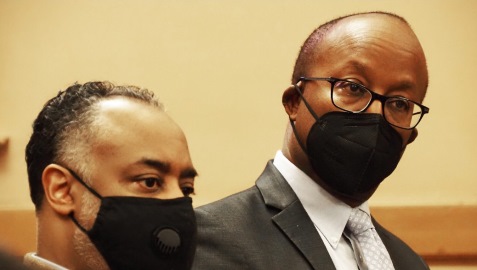
by Sherman Smith, Kansas Reflector
Topeka — Senate President Ty Masterson found inspiration in the 1987 movie “Princess Bride” on Monday as he urged senators to override the governor’s veto of a GOP-drawn congressional map.
Then, something inconceivable happened.
Despite their GOP supermajority, Republicans failed to gather the 27 votes necessary to override the veto. They deployed a procedural maneuver to hold the chamber under lockdown for hours and force two absent senators to show up and vote. The pressure tactic failed with a 24-15 final tally.
Sen. Mike Thompson, a Shawnee Republican, avoided the chamber for three hours before showing up to vote in favor of the override. Sen. Cindy Holscher, an Overland Park Democrat who would have supported the governor, was at a doctor’s appointment. Four Republicans joined Democrats in voting against the override: Dennis Pyle, R-Hiawatha; John Doll, R-Garden City; Alicia Straub, R-Ellinwood; and Mark Steffen, R-Hutchinson.
Masterson joined the opposition at the last moment in a procedural move that will allow him to make a motion to reconsider the override at a later date.
For now, the Senate vote kills the fast-tracked attempt to weaken Democratic U.S. Rep. Sharice Davids’ chances for reelection by dividing the Kansas City metro between two congressional districts. Democratic Gov. Laura Kelly used her veto authority last week to block the effort.
Democrats in the Senate renewed their assault on the map, which is known as Ad Astra 2, calling it an obvious attempt to gerrymander districts in a way that benefits Republicans and saying it dilutes the voting power of a majority-minority community in Wyandotte County.
Masterson, an Andover Republican, dismissed those concerns: “We heard words like ‘disenfranchisement,’ ‘gerrymandering.’ I think what comes to mind actually is a quote from ‘Princess Bride’ and Inigo Montoya: You keep using those words, and I don’t think they mean what you think they mean.”
The quote refers to the 35-year-old movie and its hero’s response to a character who keeps describing developments as “inconceivable.”
Throughout the months-long redistricting process, Democrats have urged Republicans to forge a bipartisan compromise. For Democrats, the failure to override the governor’s veto was like a fairytale come true, with four Republican senators saying, effectively, “As you wish.”
Davids, the only Democrat in the state’s congressional delegation, represents the Kansas City area’s 3rd District. The GOP-drawn map would have split Wyandotte County along Interstate 70, replacing the Democratic stronghold to the north with a swath of Republican voters in Anderson, Franklin and Miami counties.
The northern half of Wyandotte County would move into the 2nd District. That addition would be offset by carving heavily Democratic Lawrence out of Douglas County and placing it in the 1st district, which stretches to the Colorado border.
Republican leadership introduced the map early in the session and held hearings two days later, where lawmakers heard overwhelming opposition from residents in Wyandotte County and Lawrence. The Legislature sent the map to the governor in less than a week on party-line votes.
“The truth is, we did not adhere to our guidelines. We did not listen to the testimony. We did not do our best work,” said Senate Minority Leader Dinah Sykes, D-Lenexa. “And the truth is that we can work together to pass a map that is good for all Kansans.”
Three Republicans, Doll, Steffen and Straub, flipped their votes from Jan. 21, when the Senate passed the Ad Astra 2 map on 26-9 vote. Thompson also voted in favor of the map at that time.
The Senate session ended Monday in a hostile exchange between Sykes and Masterson over the maneuver to adjourn.
GOP leadership rushed to adjourn in an attempt to avoid a motion by Democrats to reconsider the override — a second vote would permanently kill the legislation containing the Ad Astra 2 map.
“You have failed Kansans today by stopping the vote and conversation on this matter, and I am appalled,” Sykes said.
A defiant Masterson said he couldn’t “let those accusations stand.”
“I understand the games that are being played,” he said.
Kansas Reflector stories, www.kansasreflector.com, may be republished online or in print under Creative Commons license CC BY-NC-ND 4.0.
See more at https://kansasreflector.com/2022/02/07/kansas-senate-fails-to-override-governors-veto-of-gop-drawn-congressional-map-redistricting/.

